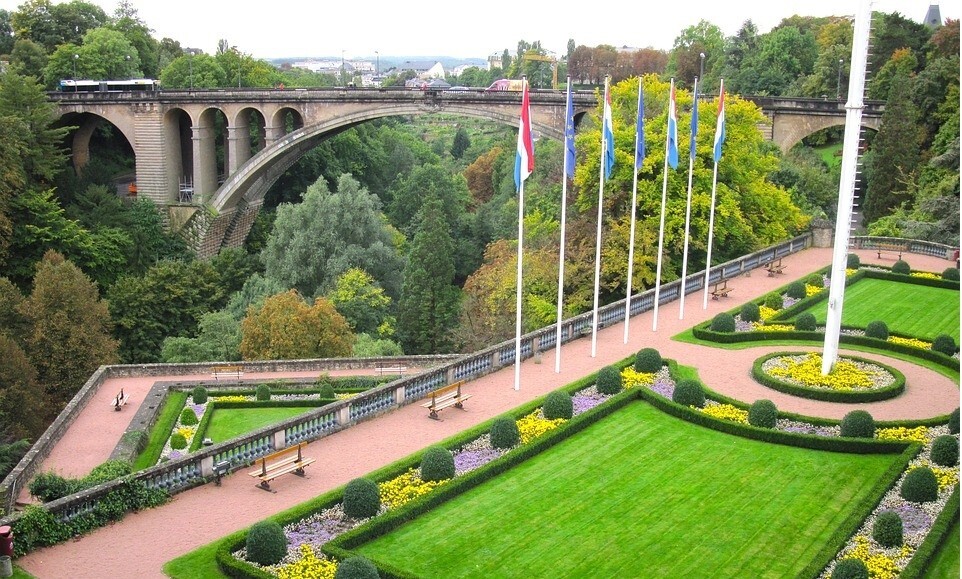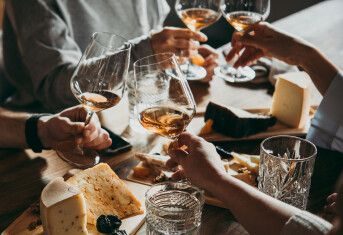Step into Luxembourg, and you’re greeted by an engaging symphony of languages. Much like the ceaseless chatter about the steep prices in Norway, Luxembourg’s linguistic tapestry becomes a persistent point of discussion.
As predictable as a Luxembourgish folk dance, any conversation here gracefully pirouettes towards the language question. “How many languages have you mastered?” or the gently empathetic, “Must be quite a challenge navigating all these tongues, eh?” These queries float around, as ubiquitous as the aroma of the city’s delectable pastries.
Let’s address the elephant in the room: Can you thrive in Luxembourg armed with just English? The answer is a resounding yes. In this bustling international enclave, English isn’t just a language; it’s a common melody that echoes through the city’s streets and squares.
In Luxembourg, where global institutions and a vibrant expat life coexist, English is the harmonious tune that unites the diversity. Be it a casual chat over kaffi knip or negotiating a corporate deal, English is the common thread that weaves through Luxembourg’s multicultural fabric.
However, the triumvirate of Luxembourgish, French, and German does lend a distinct rhythm to Luxembourg’s cultural symphony. These languages, as integral to Luxembourg as the majestic Grand Ducal Palace, add to the city’s unique charm. But they are an enriching addition, a bonus to your Luxembourg experience, not a prerequisite for survival.
So, the next time you are drawn into a conversation about the multilingual marvel that is Luxembourg, take a moment to savour the beauty of this linguistic diversity. It’s a unique experience being a part of a place where languages don’t merely coexist, they collaborate in a delightful harmony.
For an amusing and insightful perspective on Luxembourg’s multilingual scenario, do check out this article from RTL Today’s “The Luxembourg Wurst” here. It paints the linguistic picture rather aptly.
Exploring Luxembourg’s Wine Country
A Guide to Tasting Rooms and Vineyards Near the Capital:
Welcome to Luxembourg, a small country that packs a big punch when it comes to wine. From crisp whites to bold reds, prepare your taste buds for an unforgettable journey through one of Europe’s best-kept secrets – welcome to Luxembourg’s Wine Country!
Here are our top picks for the best places to enjoy a taste of Luxembourg wine in the capital city:
L’Atelier du Vin: This small and cozy spot is the perfect place to enjoy a glass (or two) of Luxembourg wine in an intimate setting and there’s often live music playing in the background too.
Le Bar Vivant: If you’re looking for a more luxurious tasting experience, head to Le Bar Vivant. It’s the perfect place to relax with friends after a long day exploring Luxembourg’s wine country.
Vinothek Wein & Ko: For something slightly different, check it out! This unique store not only offers tastings of Luxembourg wines, they also host regular events and workshops.
If you’re visiting Luxembourg City, there are a few vineyards located within an easy drive from the capital. Here are some of our favorites:
Domaine Bernard-Massard is one of the largest and most popular wineries in Luxembourg. They offer tours as well as tastings of their many different wines.
Château de Bourglinster is a beautiful castle located in the town of Bourglinster. Be sure to explore the castle grounds, they also have a wine museum and offer tastings of their wines.
Domaine Stindel is a small, family-run vineyard located in the village of Esch-sur-Sûre, offering tours and tastings by appointment only, so be sure to call ahead.
Domaines Vinsmoselle is a large cooperative that represents many different wineries in the Moselle region. They offer guided tours and tastings at their visitor center in Trier, which is about an hour’s drive from Luxembourg City.
#experience #events #winelife #skysthelimit
The Skyside Luxembourg Insiders Guide 1: A Look at Europe’s Best-Kept Secret
Luxembourg is a small but fascinating country that is sandwiched between Germany, Belgium, and France, provides a distinctive fusion of cultures, languages, and landscapes. In contrast to its more well-known neighbors, Luxembourg frequently goes unnoticed by tourists despite having a rich history, thriving art scene and breathtaking natural beauty.
It was formally established in 963 AD when Luxembourg Castle was built. The nation is now a constitutional monarchy- the Grand Duke serves as the nation’s head of state. The three official languages of Luxembourg—German, French, and Luxembourgish—reflect both its cosmopolitan history and its close links to its neighbours.
The fortress and ancient old town of Luxembourg City, the nation’s capital, are both recognized as UNESCO World Heritage Sites. Visitors can tour the Grand Ducal Palace’s magnificent medieval architecture or explore the Bock Casemates, a system of subterranean tunnels that once served as soldiers’ quarters.
Luxembourgese cuisine is a delicious blend of French and German influences. Bouneschlupp, a green bean soup with bacon and potatoes, Judd mat Gaardebounen, a smoked pork neck with wide beans and Quetsche tort, a plum tart dessert are examples of traditional fare. Tip: cosy and non fussy – Bouneweger Stuff is the place!
Luxembourg’s thriving art scene is evident in its numerous galleries, museums, and street art. The Mudam (Musée d’Art Moderne Grand-Duc Jean) houses an impressive collection of contemporary art, while the National Museum of History and Art showcases artifacts from the country’s past. The annual Night of the Museums event allows visitors to explore the city’s cultural institutions after hours, accompanied by live music and performances.
The Mullerthal Trail also known as Little Switzerland, features stunning rock formations, dense forests, and picturesque waterfalls, perfect for hiking and cycling. The Moselle Valley with its rolling vineyards and medieval castles, is an ideal destination for wine lovers and history buffs alike. For families, Parc Merveilleux is an amusement park that combines wildlife, playgrounds, and fairy tale-themed attractions.
Luxembourg hosts a variety of festivals and events throughout the year, celebrating its rich cultural heritage. The Schueberfouer, held annually since 1340, is a traditional funfair that attracts visitors from all over Europe. National Day, celebrated on June 23rd, features parades, concerts, and fireworks in honor of the Grand Duke’s birthday. The Luxembourg City Film Festival, showcasing both international and local productions, is another popular event for film enthusiasts.
Luxembourg, Europe’s hidden gem, offers a unique blend of history, culture, and natural beauty. From its charming cities and delicious cuisine to its diverse outdoor adventures and lively festivals, Luxembourg is a destination that truly has something for everyone.
Unveiling Luxembourg’s Steamy Secret: The Naked Truth About Bathing Culture
Unveiling Luxembourg’s Steamy Secret: The Naked Truth About Bathing Culture Luxembourg is located in the heart of Europe, sandwiched between Germany, France, and Belgium, and is known for its fairy-tale castles, vibrant financial sector, and culinary scene that tickles your taste buds with exquisite pastries and bold wines. However, there is one characteristic of this country that regularly surprises newcomers, particularly those from the United Kingdom: the bathing culture. The sauna is more than just a place for relaxation and cleansing in Luxembourg. It’s a whole cultural phenomena, steeped in centuries-old traditions that demand, brace yourselves, total nudity. Luxembourgers, like their Scandinavian and German neighbors, believe in going all out in the sauna, a habit that, to many Brits, may appear alarming, to say the least. Your new best friend is the humble towel. Simply bring a huge towel and cover as much (or as little) as you want. It’s a simple, yet effective approach to integrate into the local culture without straying too far from home. This national sporting and cultural facility ‘d’Coque’ in Kirchberg is conveniently positioned just two (free) tram stops away from the Kirchberg Garden Residences by Skyside and so, are you willing to give it a shot? This is where things get a little saucy; the leisure centre is called ‘d’Coque’ yes, you read that correctly, and no, don’t blush, it’s pronounced exactly like ‘cock’ in English, but let’s stay out of the gutter, shall we? Before you shudder in fear at the prospect of wearing your birthday suit in public, let’s explore a little deeper into this fascinating habit. Luxembourgers regard the human body as something natural, not something to be ashamed of. This practice is entrenched in a celebration of honesty and acceptance, which is in stark contrast to the prudishness commonly associated with nudity and, while the initial shock may cause you to reconsider your visit to the local spa, remember that when in Luxembourg, do as the Luxembourgers do! After all, isn’t it part of the joy of living abroad to embrace local customs? D’ Coque is big (ok ok), it not only has a large wellness area, but it also has an Olympic-sized swimming pool that is open to the public. Yes, for a day fee of about €3.5, you can literally swim laps where Olympians have trained. If you prefer to drive, it’s only a four-minute drive away with free parking! And now for a little secret that will take your sauna experience to the next level. Keep an eye on the Aufguss timetable while visiting and be sure to stay for a session. Aufguss is a traditional sauna ritual in which a sauna master distributes scented infusions in the heated air to improve your sauna experience and transforming your stay into an extraordinary sensory trip. So, whether you’re a seasoned sauna-goer or a timid newcomer, Luxembourg’s bathing culture offers a one-of-a-kind experience worth attempting.




